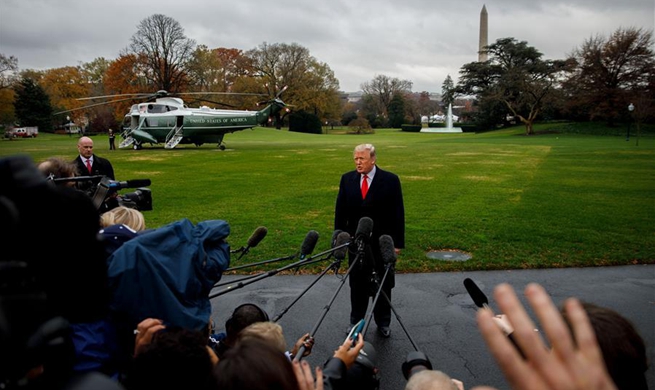ROME, Nov. 26 (Xinhua) -- Italian Prime Minister Giuseppe Conte's cabinet was considering amendments to the draft budget, the government said in a statement after a meeting late on Monday.
The possible changes to the financial plan would aim at easing an ongoing deadlock between Rome and the European Union (EU) over the country's deficit targets.
Conte discussed the topic with Economy Minister Giovanni Tria, and the two Deputy Prime Ministers Matteo Salvini and Luigi Di Maio, leaders of the two governing parties.
"It is not a matter of decimals. The government's goal is to revamp growth and development," they said in a statement after the meeting.
"As for the dialogue with the EU, we have agreed on waiting for the technical reports about those planned reforms that have a wider impact on society, in order to precisely assess the costs," the statement added.
No further details were provided with regard to how much Italy's deficit target might be reduced for the next two years, in order to find a compromise with Brussels.
Earlier in the day, however, local media reported the deficit might be cut from a planned 2.4 percent of gross domestic product (GDP) in 2019 down to 2.2 percent or 2.0 percent.
The cabinet will have to specify and quantify the possible amendments before Dec. 5, when the draft budget will begin its approval path in the lower house of the parliament.
Rome's decision to partially soften its position came after Conte met with EU Commission president Jean-Claude Juncker on Saturday, after weeks of standoff.
On Oct. 24, in fact, the EU Commission rejected the Italian budget for "particularly serious non-compliance" with EU fiscal rules.
The Italian government refused to modify its draft, and the EU executive body last week formally warned a disciplinary procedure for excessive deficit would be open against the country. Such procedure would give way to fines.
On Monday morning, PM Conte had already signaled his government -- made of a coalition between rightwing League and populist Five Star Movement (M5S) -- was reconsidering its position.
"We are working on the budget with a constructive spirit, and there is no unusual distance between the government forces," Ansa news agency quoted Conte as saying.
Conte's mention of the two governing parties was because the draft budget was overall outlined to deliver measures both League and M5S had pledged in election campaign.
Among such promises were a universal income of about 780 euros (883 U.S. dollars) to poor households, a rollback from a 2011 pension reform that raised retirement age, and an increase in public spending.
Such proposals drew support among many Italians, and voters in March chose largely in favor of the two parties, which at the time were not running as allies.
The planned expansive measures resulted in a deficit target at 2.4 percent of GDP in 2019, and at 2.1 percent in 2020.
Yet, the EU Commission argued that Italy's growth projections were too optimistic, and forecast the deficit-GDP ratio would reach 2.9 percent in 2019, and 3.1 percent in 2020 (beyond the 3.0 percent EU ceiling).
Such path would affect Italy's public finances, considering the country's debt is over 131 percent of GDP, the second largest in the bloc after Greece.
Under EU fiscal rules, a progressive decline path of public debt is required from each member country, if the debt is above 60 percent of GDP.












